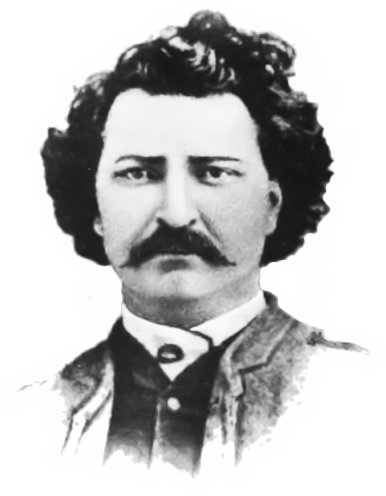According to this family tree by Aunt Ruth my family, on Sharron side, are descendants of Louis Riel.
Fred B. Sharron's mother was Mary Reil. She married John Barthrlrmy Charron on Setpember 26, 1865. During the Civil War John's last name was changed to Sharron. Loius Reil led two rebelliions against the Canadian Goverment: He was hanged for leading the North-West Rebellion of 1885.
Louis Riel - An Ancestor

Who was Louis Riel?
Louis Riel is probably one of the most controversial figures in Canadian history, and depending on your point of view, he is often considered either a traitor or a patriot.. He was a political leader of the Métis people in Canada and is often referred to as the founder of Manitoba. After leading a rebellion against the Canadian government in 1885, Louis Riel was hanged for treason in what is probably the most famous trial in Canada.
The Métis are a mixed race group of people who descend from First Nation people and European settlers, and are recognized as one of Canada’s aboriginal peoples. Louis Riel was a Francophone whose paternal grandfather was a voyageur who married a French-Chipewyan Métis.
In 1885, Louis Riel led an armed uprising of the Métis people against the Canadian government in what became known as the North-West Rebellion. They believed the Canadian government had failed to protect many of their rights. Although the Métis initially won a few of the early battles, they eventually lost the war at the Battle of Batoche. A few day later, Louis Riel surrender to the authorities and was tried and hanged for treason.
Louis Riel’s death had lasting political ramifications and helped to galvanize French-Canadian nationalistic opposition to the Canadian government that continues even to this day.
Famous Kin
Louis Riel’s famous kin include the 15th Prime Minister of Canada Pierre Trudeau, and his son Justin Trudeau, the 23rd Prime Minister of Canada. He also has a number of celebrities in his family tree including singer and songwriter Madonna, actor Chris Pratt, Dancing with the Stars’ Julianne and Derek Hough, actor Dax Shepard, singer and songwriter Justin Bieber, and actors Mark and Donnie Wahlberg.
from Wikapedia
Louis Riel (/ˈluːi riˈɛl/; French: [lwi ʁjɛl]; 22 October 1844 – 16 November 1885)
Arguably, Riel has received more formal organizational and academic scrutiny than any other figure in Canadian history.[2] The trial and conviction of Louis Riel has been the subject of historical comment and criticism for over one hundred years.
He was a Canadian politician, a founder of the province of Manitoba, and a political leader of the Métis people. He led two resistance movements against the Government of Canada and its first prime minister, John A. Macdonald. Riel sought to defend Métis rights and identity as the Northwest Territories came progressively under the Canadian sphere of influence.
The first resistance movement led by Riel was the Red River Resistance of 1869–1870. The provisional government established by Riel ultimately negotiated the terms under which the new province of Manitoba entered the Canadian Confederation. Riel ordered the execution of Thomas Scott, and fled to the United States to escape prosecution. He was elected three times as member of the House of Commons, but, fearing for his life, he could never take his seat. During these years in exile he came to believe that he was a divinely chosen leader and prophet. He married in 1881 while in exile in the Montana Territory.
In 1884 Riel was called upon by the Métis leaders in Saskatchewan to help resolve longstanding grievances with the Canadian government, which led to armed conflict with government forces, the North-West Rebellion of 1885. Defeated at the Battle of Batoche, Riel was imprisoned in Regina where he was convicted at trial of high treason. Despite protests, popular appeals and the jury's call for clemency, Riel was executed by hanging. Riel was seen as a heroic victim by French Canadians; his execution had a lasting negative impact on Canada, polarizing the new nation along ethno-religious lines. The Métis were marginalized in the Prairie provinces by the increasingly English-dominated majority. An even more important long-term impact was the bitter alienation Francophones across Canada felt, and anger against the repression by their countrymen.[1]
Riel's historical reputation has long been polarized between portrayals as a dangerous religious fanatic and rebel opposed to the Canadian nation, and, by contrast, as a charismatic leader intent on defending his Métis people from the unfair encroachments by the federal government eager to give Orangemen-dominated Ontario settlers priority access to land. Arguably, Riel has received more formal organizational and academic scrutiny than any other figure in Canadian history.[2] The trial and conviction of Louis Riel has been the subject of historical comment and criticism for over one hundred years.

